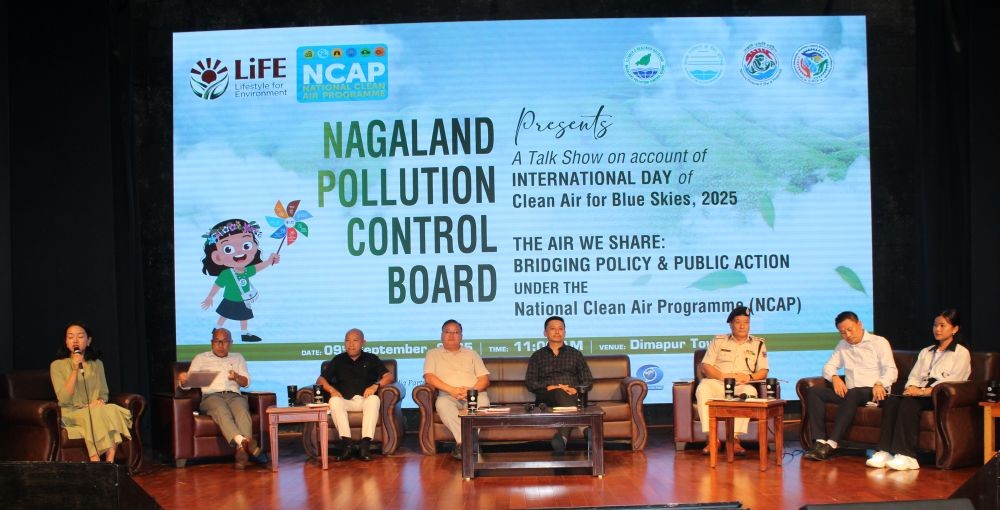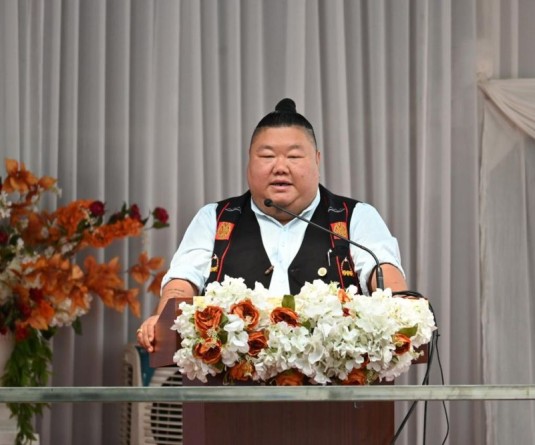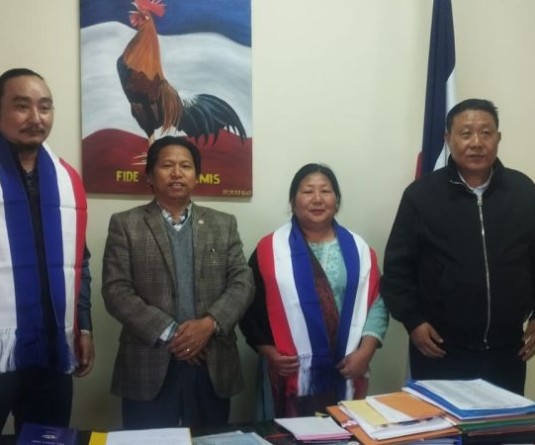The panellists during the talk show to mark the International Day of Clean Air for Blue Skies, held at Dimapur Town Hall on September 9.

Morung Express News
Dimapur | September 9
The Nagaland Pollution Control Board (NPCB) organised a talk show to mark the International Day of Clean Air for Blue Skies, held at Dimapur Town Hall on September 9. The day, designated by the United Nations, highlights the urgent need to reduce air pollution and promote sustainable practices for better air quality.
The event brought together key stakeholders—government officials, civil society, activists/social workers and youth to discuss challenges and share best practices to foster collaborative solutions for cleaner air in the city and the state.
The talk show was centred on the theme “The Air We Share: Bridging Policy & Public Action” under the National Clean Air Programme (NCAP). The panel comprised Dr Tinojongshi Chang, Deputy Commissioner, Dimapur; Dr T Yetovi Tuccu, Chief Medical Officer, Dimapur; Thungchanbemo Tungoe, Chief Executive Officer (CEO), DMC; Hukato K Chishi, IFS, Member Secretary, NPCB & State Nodal Officer, NCAP; I Meren Chenth, Deputy Commissioner of Police (Traffic), Dimapur; Mhonchan Humtsoe, President, Team Better Dimapur; and Neiketouno Thapo, Bachelor of Social Work (NEISSR).
Addressing the gathering, Hukato K Chishi, IFS, Member Secretary, NPCB & State Nodal Officer, NCAP, said that the air quality of Dimapur did not meet the standards set by the NPCB, and that was the reason for the event.
Deputy Commissioner Dr Tinojongshi Chang acknowledged the Ministry of Environment and Climate Change for selecting Dimapur and Kohima for the NCAP programme. Over the last five years, NCAP has provided funds for strategies and programmes aimed at cleaner air.
Under this initiative, with the participation of all line departments and NGOs, funds are distributed accordingly. In the case of Dimapur, he explained, pollution largely stems from poor road conditions, hence the bulk of the funds are allocated to road maintenance.
Dr Chang further noted that the administration partners with NGOs, schools and the DMC to conduct awareness programmes and plantation drives.
The CEO of DMC, Thungchanbemo Tungoe, remarked that collective effort was crucial to improve the air we breathe. He said the DMC is actively engaged in identifying and mitigating localised air pollution, such as road dust and emissions, through regular road cleaning. He discouraged open burning of waste and informed that the council is planning to develop a special vehicle to curb roadside dust.
Tungoe appealed to the public, particularly the student community, to support the administration, police and all stakeholders in improving air quality, stating that clean air would not only improve health but also bring positive changes to towns and cities.
While sources of air pollution include road dust and industries, vehicular emissions remain a major contributor in cities. On this, DCP (Traffic) I Meren Chenth observed that traffic congestion in Dimapur is worsening. He highlighted the introduction of an improvised traffic management system in two locations and initiatives such as the autorickshaw display system, which helps regulate the movement of autorickshaws within city limits. No-parking signages have also been installed in narrow stretches.
Chenth informed that further strategies are in the pipeline under NCAP, including the installation of improvised traffic management systems at Dhobinalla and Deluxe Point. Plans are also underway to install high-resolution ANPR cameras at four crucial junctions—Dhobinalla, Tragopan, Purana Bazaar and Nagarjan—to monitor traffic flow. He added that comprehensive plans for urban traffic decongestion, such as flyovers, underpasses, connecting and approach roads, are being considered and are expected to materialise soon.
This was the second talk show under NCAP, the first having been held in Kohima. Chief Medical Officer Dimapur, Dr T Yetovi Tuccu, spoke on the impact of air quality on health. He explained about the sentinel surveillance system established a year ago, which monitors climate change and adverse health effects. Data collection under this surveillance, he said, would help improve future interventions against air pollution.
Team Better Dimapur, a community-based organisation, also shared its vision of making Dimapur ‘greener, cleaner and healthier.’ Apart from cleanliness and plantation drives, the team engages in community service every year. With 18 core members, 30 members and about 200 community participants, its President, Mhonchan Humtsoe, admitted that while its ambition to make Dimapur “the garden city” may sound bold, it remains the organisation’s core objective.
Youth representative Neiketouno Thapo, a Bachelor of Social Work student, shared her perspective on environmental pollution in Dimapur. She said the impact of air pollution is felt daily, with dust and smoke making the air heavy. With fewer trees along the roads, fresh air is lacking, often causing headaches, coughs and allergies. She added that pollution and lack of greenery are making summers harsher, forcing institutions to extend summer breaks. “Air pollution is not just about the atmosphere, but it is shaping our health, comfort and even education,” she remarked, while being positive that collective effort could lead to a healthier environment.
On waste management, Tungoe admitted that stopping open burning of waste remains one of DMC’s greatest challenges, as many residents continue the practice. Despite the existence of a dumpsite and daily door-to-door collection, he urged citizens to dispose of waste responsibly, warning of the severe pollution caused by burning. He emphasised that effective enforcement alone is not enough unless individuals and households take responsibility.
Hukato K Chishi noted that while the day’s focus was air pollution, solid waste management was equally critical. Referring to the Solid Waste Management Rules 2016, he explained that waste management involves three entities: the Urban Local Bodies (ULBs), such as DMC and KMC; the State Pollution Control Board; and the waste generators—both bulk and individual. “You and I are all waste generators, and the responsibility rests with us,” he said.
He explained that the mandate of ULBs such as DMC is to provide logistics, machinery and facilities for waste collection and processing, with waste brought to a scientific landfill. Ideally, all debris should be processed, recycled and reused, with only 10 per cent reaching the landfill.
Chishi stressed the importance of waste segregation at household level into three categories—biodegradable, non-biodegradable and domestic hazardous waste (such as sanitary napkins). He noted that dustbins had been provided in towns and colonies, though many were no longer visible. He also pointed out that, as per the Act, the DMC has the right to levy collection fees.
The event concluded with an interactive session where students posed questions to the panel. Earlier, Yanathung Kithan, Scientist ‘B’ and Nodal Officer, NCAP, NPCB, delivered the keynote address. The discussion was moderated by Rongsenben Longkumer, Junior Scientific Assistant, NPCB, while Olivi G Chophy, Senior Scientific Assistant, NPCB, chaired the programme.





